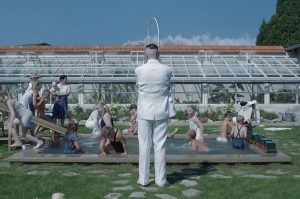WHAT a year it’s been for Sandra Huller, giving terrific performances in two of the best films of 2023.
The German actress played the lead role in Anatomy of a Fall and one of the two main characters in Jonathan Glazer’s brilliant The Zone of Interest.
The latter is a fascinating German film that depicts the darkest period of human nature in that country’s history in a manner not seen before in dramatic feature mode.
Glazer’s script is loosely based on the 2014 novel by Martin Amis about Nazi officer Rudolf Höss who was a commandant at the Auschwitz concentration camp during World War II.
It’s 1943 and Rudolf lives with his wife Hedwig (Hüller) and their five children on a sprawling property right next to one of the camp walls.
It’s a neat and pretty home with a beautiful garden and plenty of room for the kids to play. There’s a river nearby where the family swim, fish and host picnics with their friends on the banks.
Hedwig in particular sees their life as idyllic, despite the constant horrific sounds coming from over the wall.
Rudolf, chillingly played by Christian Friedel, is completely immune to the suffering and systemised murder of hundreds of people on a daily basis, enjoying a quick birthday celebration with the family before mounting his horse to enter the camp for another day’s work.
Meanwhile Hedwig and her friends sift through the best of the clothing from the camp inmates, freshly cleaned and pressed for their examination. One of the children plays with a set of gold fillings on their bed before going to sleep at night. The servants lucky enough to have been given tasks at the home move quickly and silently, avoiding eye contact with their masters.
Rudolf loves his family almost as much as his work which gives him the opportunity to solve the challenges of how to exterminate people as expertly as possible while introducing a new, improved incinerator for efficient body disposal.
As the family goes about their daily lives, we as an audience are screaming internally, bewildered as to the depths of cruel indifference to which our species is capable of descending.
But Glazer refuses to give us the outcomes or even answers that we would normally desire or expect from such a tale, instead leaving breadcrumbs of unspoken actions and gestures that may provide an inkling into understanding of what we see unfolding.
The soundscape is breathtaking with sporadic gunfire, screams, dog barks and machinery providing a constant reminder of the reality being shut out.
Every technical aspect of the film demonstrates the passion and care that was taken in preparing over years for the start of filming at a location close to the original home.
For example, according to Wikipedia, planting of the gardens started almost two years prior and the background sounds were based on actual recordings with the volume varied for the exact distances to where they would have originated within the camp.
Technically brilliant and emotionally devastating, Glazer’s best film will haunt your memories for some time.
Watched at the cinema.
